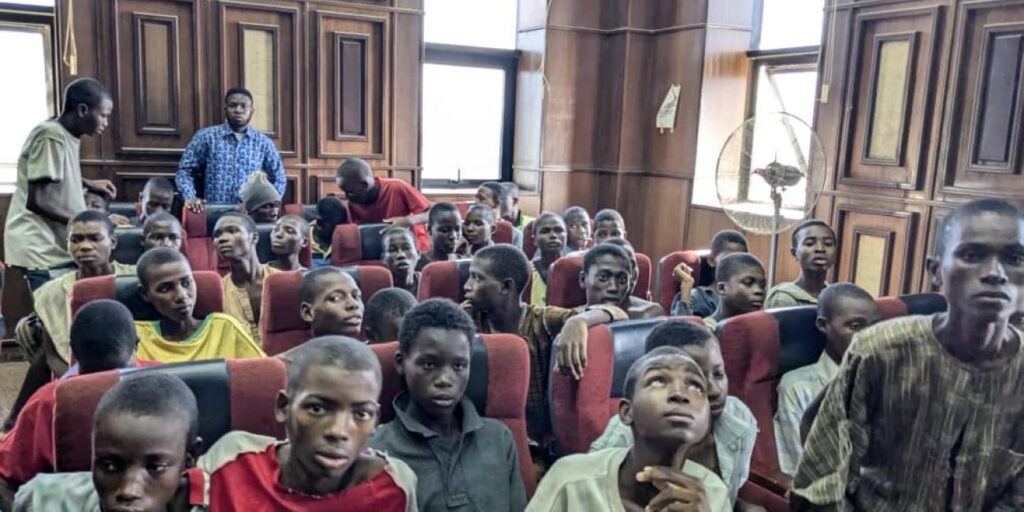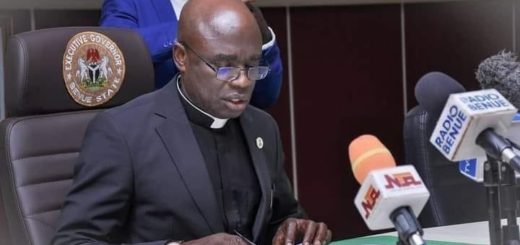Street Kid Africa Foundation Condemns the inhumane Treatment and prosecution of Underage Children by the Nigerian Government; makes recommendations by Ehiwe O. Samuel
In recent years, Nigeria has faced mounting scrutiny over the prosecution of minors, a practice that stands in stark contrast to both national and international laws protecting the rights of children. It will be recalled that police had on Friday, November 1, 2024 arraigned 72 persons that included minors, before the Federal High Court in Abuja for participating in the recent nationwide protest. The 10-count charge against the defendants bordered on treason. Four minors that were cited as defendants in the case collapsed before the charge could be read to them in court, a development that prompted their exclusion from the trial.
As an organisation that caters for the wellbeing of underprivileged kids in Africa, Street Kid Africa condemns the prosecution of underage children by the Nigerian government which not only disregards their fundamental human rights but also undermines the nation’s commitment to safeguarding its youth and nurturing a future generation free from systemic oppression.
Children in Conflict with the Law: A Crisis of Justice
Reports of minors being detained, tried, and even sentenced for offenses highlight a deeply troubling reality: Nigeria’s criminal justice system is failing to protect its most vulnerable citizens. The prosecution of children, who by legal definition lack full culpability for their actions, often subjects them to the same procedures as adults, stripping away their rights and leaving them with permanent scars—both physical and psychological.
Nigeria’s own Child Rights Act of 2003 prohibits such practices. The Act defines a child as anyone under the age of 18 and establishes specific protections for children involved in the legal system, including rehabilitation and reintegration over punishment. Yet, in many states, these laws are inconsistently applied or outrightly ignored. The absence of national adherence to these guidelines exposes minors to unjust treatment, from prolonged detention without trial to sentencing in adult courts.
International Standards and Nigeria’s Obligations
By prosecuting underage children, Nigeria breaches its obligations under international treaties, including the United Nations Convention on the Rights of the Child (UNCRC), to which it is a signatory. The UNCRC emphasizes that children in conflict with the law must be treated in a way that promotes their dignity and self-worth, ideally diverting them from judicial proceedings altogether. The aim is not punitive but rehabilitative: to provide guidance, counselling, and education rather than expose children to the criminal justice system.
Harmful Impacts on Vulnerable Children
The prosecution of children is not only legally indefensible but also morally unconscionable. Children who are prosecuted and subjected to punitive measures instead of receiving necessary care are more likely to develop lasting psychological trauma, lose access to education, and face barriers to societal reintegration. Criminalizing children disproportionately affects those already marginalized, often ensnaring impoverished and vulnerable youth in a cycle of institutionalization that deprives them of basic rights and future opportunities.
Detaining children in overcrowded, inadequate facilities, sometimes alongside adults, exposes them to physical and psychological abuse. Stories of young detainees subjected to violence, neglect, and exploitation are all too common, underscoring the urgent need for systemic change. Such treatment not only violates their human rights but perpetuates a cycle of trauma and criminality, pushing these young individuals further from positive societal roles.
A Call for Reform and Accountability
As a responsible organisation, we call on the Nigerian government to take immediate steps to align its practices with national and international standards on children’s rights. Our recommendations on key reforms include:
1. Consistent Enforcement of the Child Rights Act: All Nigerian states should adopt and uniformly enforce the Child Rights Act, ensuring that no child under 18 is treated as an adult in legal proceedings. This Act must be the foundation of juvenile justice across the country.
2. Establishment of Juvenile Courts and Rehabilitation Centers: Dedicated juvenile courts with trained personnel and specialized rehabilitation centers must replace conventional detention facilities for children in conflict with the law. These institutions should focus on counselling, skill-building, and reintegration to support the long-term wellbeing of these children.
3. Training for Law Enforcement and Judiciary Officials: Judges, prosecutors, and law enforcement officers must receive specialized training in handling cases involving minors, understanding the developmental differences and unique needs of children. This training would help officials make decisions that prioritize rehabilitation over punishment.
4. Enhanced Monitoring and Transparency: Independent organizations, both local and international, should be granted access to monitor detention facilities and ensure that children’s rights are not being violated. Transparency in juvenile justice practices can foster accountability and prevent abuses within the system.
Conclusion
The prosecution of underage children by the Nigerian government not only defies legal mandates but also signals a broader failure to protect the rights and dignity of young Nigerians. A child who makes a mistake deserves guidance, not a prison sentence. Nigeria’s future depends on its youth, and by nurturing rather than criminalizing them, the nation can ensure a brighter tomorrow. It is high time for the government to prioritize child protection, reform juvenile justice practices, and commit fully to safeguarding the rights of its most vulnerable citizens. The world is watching—and so are Nigeria’s children.
Written by Ehiwe O. Samuel
President, Street Kid Africa Foundation
09038399278














